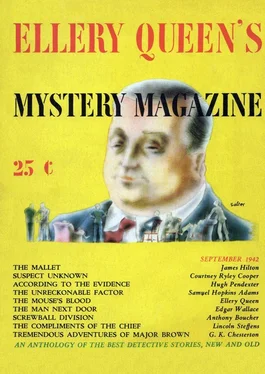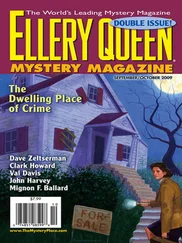Энтони Бучер - Ellery Queen’s Mystery Magazine. Vol. 3, No. 4, September 1942
Здесь есть возможность читать онлайн «Энтони Бучер - Ellery Queen’s Mystery Magazine. Vol. 3, No. 4, September 1942» весь текст электронной книги совершенно бесплатно (целиком полную версию без сокращений). В некоторых случаях можно слушать аудио, скачать через торрент в формате fb2 и присутствует краткое содержание. Город: New York, Год выпуска: 1942, Издательство: The American Mercury, Жанр: Детектив, на английском языке. Описание произведения, (предисловие) а так же отзывы посетителей доступны на портале библиотеки ЛибКат.
- Название:Ellery Queen’s Mystery Magazine. Vol. 3, No. 4, September 1942
- Автор:
- Издательство:The American Mercury
- Жанр:
- Год:1942
- Город:New York
- ISBN:нет данных
- Рейтинг книги:4 / 5. Голосов: 1
-
Избранное:Добавить в избранное
- Отзывы:
-
Ваша оценка:
- 80
- 1
- 2
- 3
- 4
- 5
Ellery Queen’s Mystery Magazine. Vol. 3, No. 4, September 1942: краткое содержание, описание и аннотация
Предлагаем к чтению аннотацию, описание, краткое содержание или предисловие (зависит от того, что написал сам автор книги «Ellery Queen’s Mystery Magazine. Vol. 3, No. 4, September 1942»). Если вы не нашли необходимую информацию о книге — напишите в комментариях, мы постараемся отыскать её.
Ellery Queen’s Mystery Magazine. Vol. 3, No. 4, September 1942 — читать онлайн бесплатно полную книгу (весь текст) целиком
Ниже представлен текст книги, разбитый по страницам. Система сохранения места последней прочитанной страницы, позволяет с удобством читать онлайн бесплатно книгу «Ellery Queen’s Mystery Magazine. Vol. 3, No. 4, September 1942», без необходимости каждый раз заново искать на чём Вы остановились. Поставьте закладку, и сможете в любой момент перейти на страницу, на которой закончили чтение.
Интервал:
Закладка:
“Tidy-sized mallet might do,” said the man, with fatuous simplicity. “I’m a carpenter by trade, I am, an’ I’m pretty well used to a mallet.”
Potterson’s eyes lit up with a hectic gleam. “Shplendid! Glad to hear y’can do shomething. An’ a mallet’sh all right — jusht as good as a hammer — perhapsh better.”
“But what abart after that, mister? My cousin’s brother-in-law, what I was tellin’ you of, ’e ses to me that the real trouble abart these things is gettin’ rid o’ the body arterwards.”
“Cousin’sh brother-in-law’sh a fool. Dishpose of the body — eashy to any man of brainsh!”
“Well, ’ow abart it?”
“Eashy, I tell you.”
“But — in this ’ere case, mister — on a train?”
“Eashy. Ain’t there a river to crosh — an’ a big bridge — jusht before the train getsh to Millport?”
“That’s right, mister. Three-arch bridge over the River Fayle.”
“Dammit, then — can’t y’shee? Eashy to any man of brainsh. Ash train crashes bridge, open door an’ throw body over par — parapet into river! Heh? Ain’t that a good plan? Now would you — would you have thought of that, hey? Or you, m’dear?” He turned to the woman, eager to taste the reward of his triumph.
She laughed. “Somebody’d see you from the tow-path, most likely.”
“Ah!.. that’sh clever of you, m’dear. Thish li’l plan o’ mine worksh besht in winter. Nobody on tow-path in winter — choosh nice rainy night in December — November — Chrishmash... An’ lishen to me — it’sh a damn good plan, I tell you — becosh — becosh when the body comesh ashore — they’ll shay — poor feller — shad accshident — fell backwardsh — mark on hish head where he hit par — parapet. An’ thoshe who don’t believe that’ll shay — ’coursh it’sh shuicide really, on’y relativesh tryin’ t’hush thingsh up...” God — what was he talking about — what had he been saying? Who, anyway, had begun this fool argument? He was mad; the room was whirling round and round; his brain was on fire.
The woman was still laughing. “Yes, it’s a plan all right, I’ll grant that. Only I’d like to see my Bert throwin’ the body out, that’s all! Why, ’e couldn’t ’ardly throw a dead cat over a fence!”
For the second time that night Potterson laughed till the tears ran down from his whisky-sodden eyes. Triumph! He had scored over them all. She was laughing with him now, not at him; he could feel her yielding to him — realizing his power and strength as he had willed her to. Lord — what a grand world it was for those who were born to be natural lords over their fellows!
“Mebbe he couldn’t!” he cried hoarsely. “But I never guar-guaranteed he could, did I? It’sh a job for a man of shtrength, not for a weakling! All th’world ish open to th’man of shtrength — shtrength and brainsh — both t’gether — an’ the weakesht goesh to th’wall!” It was the eternal saga of his dreams.
“Well, mister,” said the little man, “you’ve give me a fair answer, I’ll say that. An’ now p’rhaps you’ll ’ave just a last drink with me?”
“Dummind. ’Nother one, Georsh.”
He knew he was perfectly drunk — too drunk to know what he was doing or saying. Yet a blind insensate pride in himself made him believe that never, never had he triumphed so mightily. And all because of the woman. But for her a little idle boasting, might have been — but nothing else. It was she who had driven him to claim this strange and utmost triumph. She was the sort he would do anything for — just as he had done for Maudie Raines so many years ago. Always women had been his weakness — his weakness by making him feel so strong. There was nothing he would not have done for a woman he fancied. And there was nothing still that he would not do. At fifty-seven the same fire was in him — the same as at twenty-seven...
While he was drinking he made to put his arm round the woman’s waist and this time she did not repulse him. His head throbbed and sang with exhilaration. He was winning her! His arm closed round her, and again he felt that entrancing delicate shrinking of her body away from him. She shrank, but somehow diffidently, almost invitingly.
“Satishfied I’m a man of my word, m’dear?” he hiccupped, and she replied:
“I’ll certainly say you are if you’ll answer me just one more question. You know, they always do say that it’s the little things as gets a man down, as often as not. Now take that mallet, f’rinstance. What’d you do with it afterwards? If you was to throw it into the river with the body it’d float and be washed ashore somewhere, and then, mebbe, with the bloodstains on it, it’d give you away — quite likely, anyhow. So you see, young feller, that looks to me the weak spot in your plan — that mallet. Couldn’t you get rid of it some way or another?”
“Yes, mister,” the little man echoed in his plaintive whine. “I ’adn’t thought o’ that, I admit — but my old gel — she’s a regl’lar smart ’un — trust ’er for not missin’ anythin’.”
A murmur went round the bystanders. “Yes, I reckon ’e’s got you there, mister! Tell us what you’d do with the mallet!”
The mallet... What would he do with it? Potterson fought for coherence — for coherence to think as well as to speak. The Mallet ... extraordinary that anyone should be asking him questions about a mallet!
He glanced down and saw the woman’s eyes fixed on him. His brain reeled with joy; he began to tremble. She was his; she no longer shrank away from his touch or even tried to — he could feel her breath rising and falling like a livid ache in his own body. It was his moment — the moment for which he had always lived.
“The mallet — the mallet — tell me!” she whispered, and he knew then that he would answer even that last question — that last question and answer that would remove the final barrier between himself and her! “Mallet?” he roared, in a voice that made passers-by in the market place outside stop to wonder what was happening. “Yesh — ’course you oughter deshtroy th’mallet! Think Parker Pottershon’sh fool enough t’forget important thin’ li’ that? Yesh... gotter deshtroy mallet — altogether — shomehow...”
“But, ’ow, that’s the question, mister?” queried the little man, with that strange, half-pathetic, half-exasperating patience.
Potterson smiled then — a wide, uncanny smile from which all the light had gone out except the hideous light of evil. “That’sh right. Lemme think. How deshtroy mallet? Ah... Idea. Idea o’ mine — brainsh full o’good ideash — heh? Ain’t there a slag-heap jusht outshide Millport Shtation — one o’ them burnin’ shlag-heapsh near gashworksh?”
“That’s right, mister.”
“Then, by God, ain’t it eashy — eashy as kishin’ a pretty woman like yo’ wife — throw mallet on shlag-heap — an’ in a minute — two minitsh — all burned to shinder!”
And with a strange weakness in all his limbs he reeled towards the face that at that final moment sharply eluded his.
“So that’s how you did it?” said the little man suddenly, speaking in a different voice and, as it were, from a different world. “I’d always had my suspicions, ever since they found that half-burned mallet on the edge of the slag-heap. You aimed badly, I’m afraid...” And in a more level voice he added: “Parker Potterson, alias Richard Morley, I arrest you for the willful murder of Thomas Raines on the night of December the twelfth, Eighteen-Ninety-Eight...”
Two of the bystanders seized his arms and led him away, the little man and the woman following...
Читать дальшеИнтервал:
Закладка:
Похожие книги на «Ellery Queen’s Mystery Magazine. Vol. 3, No. 4, September 1942»
Представляем Вашему вниманию похожие книги на «Ellery Queen’s Mystery Magazine. Vol. 3, No. 4, September 1942» списком для выбора. Мы отобрали схожую по названию и смыслу литературу в надежде предоставить читателям больше вариантов отыскать новые, интересные, ещё непрочитанные произведения.
Обсуждение, отзывы о книге «Ellery Queen’s Mystery Magazine. Vol. 3, No. 4, September 1942» и просто собственные мнения читателей. Оставьте ваши комментарии, напишите, что Вы думаете о произведении, его смысле или главных героях. Укажите что конкретно понравилось, а что нет, и почему Вы так считаете.












